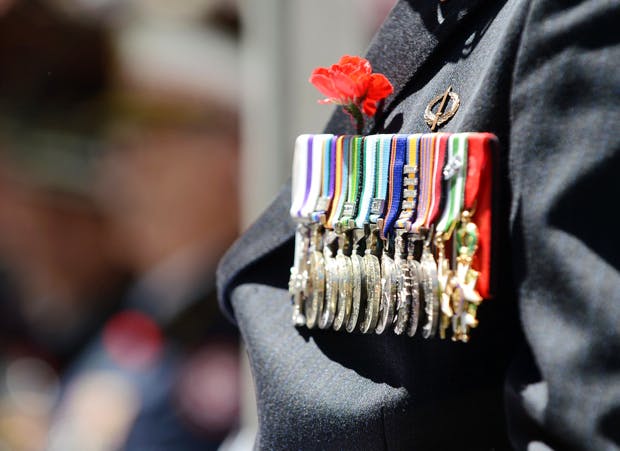Mr Keating cannot help himself. The solemnity and splendour of the Remembrance Day service in a drizzling Canberra was a deeply moving occasion. It was marred only by some of the notes struck in Mr Keating’s oration. It recalled his wretched Redfern speech of 1992 when he turned what should have been a celebration of indigenous culture and achievement into a contemptuous dismissal of Australia and Australians. (‘We brought the diseases. We committed the murders.’) In Canberra he turned the remembrance of those who died in the country’s service into a general condemnation of foreign and especially Empire wars. ‘The First World War,’ he told us, ‘was devoid of any virtue’ — as if defeat would not have bothered us. He rejoiced that the young today are ‘too wise’ to be ‘dragooned’ into war like their forebears ‘who had little or no choice’ — apparently unaware that the first AIF was a volunteer army. It as if Mr Keating belongs to some private sect that espouses Australian nationalism but despises Australians.
Good news that the Abbott government is scrapping some of the hundreds of little boards set up over the years. But if we are going to cut back on bureaucracy, how about abolishing some of the big battalions like, say, the Commonwealth department of education which should not have been created in the first place? One good suggestion was made the other day when Nick (Lucky Culture) Cater called for the abolition of the nine state and federal Human Rights Commissions which do no good at all. He was giving an after-dinner speech at the 25th annual conference of the Samuel Griffith Society established to defend the federal (and federalist) constitution against the relentless and stifling centralism of the Commonwealth. Another good proposal at the conference was to abolish the committee to implement a national curriculum in schools. Anne Twomey passionately denounced it for imposing drab uniformity and modish fads. Yet despite a series of powerful speakers over the years, the federalists have not been able to restrict the march of centralism, supported, as it usually has been, by Liberal MPs, both state and federal, who preach federalism but practise centralism. Part of the problem has also been the centralising High Court. Greg Craven stated bluntly that one of the big mistakes of the founding fathers in the 1890s was to create an arrangement where, in a dispute between the Commonwealth and the States, the Commonwealth alone appoints the judges to adjudicate the dispute.
This prompted my exhuming some buried memories of my own experience. Back in an earlier life almost 40 years ago, I was chairman of a Select Committee of the NSW Legislative Assembly to consider the appointment of judges to the High Court — appointments shrouded, as the late Geoffrey Sawer put it, in ‘murk and mystery’. (The Whitlam government had just appointed Lionel Murphy to the Court.) Our Select Committee deliberated for months. It received submissions from around Australia and around the world. But it quickly became apparent that there was not the slightest possibility the Commonwealth would ever relinquish one iota of its anomalous power over High Court appointments. The Committee finally faced a hopeless choice between two options. We could recommend the amendment of the Constitution to allow the States some say in appointments to the High Court — an option that was quixotic and doomed. Or we could call — as in the end we did — for the establishment of an advisory High Court Appointments Commission composed of the Attorneys-General of all States and the Commonwealth. The Commonwealth would have the final say and could reject the Commission’s advice. But the proposal would at least build in a consultative process involving the States, including the smaller States, and reduce the ‘murk and mystery’ of the whole business. Commonwealth ministers paid some lip-service to the report but it had little influence. In any case it was engulfed by the dismissal of the Whitlam government. The triumphant march of centralism soon resumed and even quickened its pace.
I have exhumed another cautionary memory. By 1978 I was Leader of the Opposition in New South Wales. In that year the Fraser government passed an Income Tax (Arrangements with the States) Act by which any state could vary, reduce or increase the personal income tax paid by its residents. I welcomed the measure as a step towards returning some financial independence to the states, and in the NSW Legislative Assembly introduced a Rebates to Taxpayers (Personal Income Tax) Bill. The State Labor government rejected it (‘double taxation’) and it did not pass. But it became Liberal party policy in the coming election. In this cause I called on Dick Hamer, Premier of Victoria, to discuss this and other reforms. I hoped to win his support for my Bill. But he would not be drawn in any way into the debate. When I told him I proposed to mention to the press that at least we had discussed it, he became agitated. He insisted that I not refer to it at all. In the NSW election soon afterwards Labor won easily (and I lost my seat.) The Hawke government repealed the Fraser legislation in 1989 without controversy. It does not rate a mention in the Fraser memoirs. My small efforts to advance the federalist cause had failed. I hope and expect the Samuel Griffith Society to be more successful. But Greg Craven for one is not optimistic.
Got something to add? Join the discussion and comment below.
Get 10 issues for just $10
Subscribe to The Spectator Australia today for the next 10 magazine issues, plus full online access, for just $10.














Comments
Don't miss out
Join the conversation with other Spectator Australia readers. Subscribe to leave a comment.
SUBSCRIBEAlready a subscriber? Log in